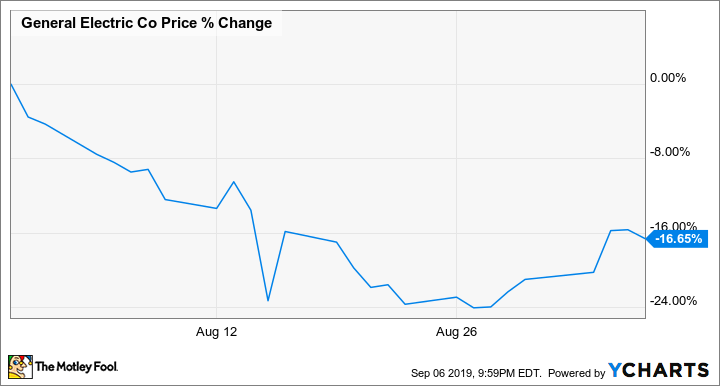What happened
Shares of General Electric (GE +0.63%) fell 21.1% in August, according to data from S&P Global Market Intelligence, after a prominent financial critic declared the company "a bigger fraud than Enron." That's a powerful accusation, and one that certainly got investors' attention. However, there are reasons to believe not all is as bad at GE as the critic claimed.
So what
General Electric is far removed from its days on the list of top growth stocks, plagued in recent years by financial weakness made worse by poor acquisitions and mismanagement. CEO Larry Culp took over in October 2018 with a plan to divest underperforming assets and pay down debt, but even bulls concede his ambitious plan will take years to play out.

GE's GE9X engine. Image source: General Electric.
Shares of GE lost more than half their value between the beginning of 2017 and early 2019 but had stabilized in recent months as Culp worked to ease concerns and implement his plan.
That all changed in August, when Bernie Madoff whistleblower Harry Markopolos suggested GE's issues are far worse than the company has disclosed. The investor in a 175-page report details various losses, writedowns, and scandals that have haunted GE in recent years and claims GE is undercounting its insurance reserves. Markopolos also claims GE should have booked greater losses on its investment in Baker Hughes, a GE Company (BHGE +0.69%), and questioned the margin performance in some of its aerospace units.
Investors understandably reacted to the accusations by running for the exits, sending shares of GE plummeting.
Now what
In the weeks since the report was released, GE and its defenders have fired back. Culp, after GE shares plunged, bought more than 250,000 shares at roughly $7.93 apiece, a move designed to show investors he remains confident in the turnaround.
A number of financial analysts have also rallied to the company's defense. Deutsche Bank's Nicole DeBlase called the Markopolos report "messy" and filled with arguments that were either "weak" or "plainly incorrect." Citi's Andrew Kaplowitz wrote that he remains encouraged by GE's positive momentum and said GE's potential for improvements heading into 2020 "could be more significant than we think some investors appreciate."
Shares of GE have begun to make back what was lost last month but still trade well below where they were heading into August.
There is a case to be made that Markopolos' report overstated GE's issues, but even the optimists concede it is going to take time to right the ship and return to growth. If Markopolos is incorrect, there is an opportunity right now to get GE shares at a bargain price, but be aware that even in the best-case scenario this is a long-term reclamation project.








